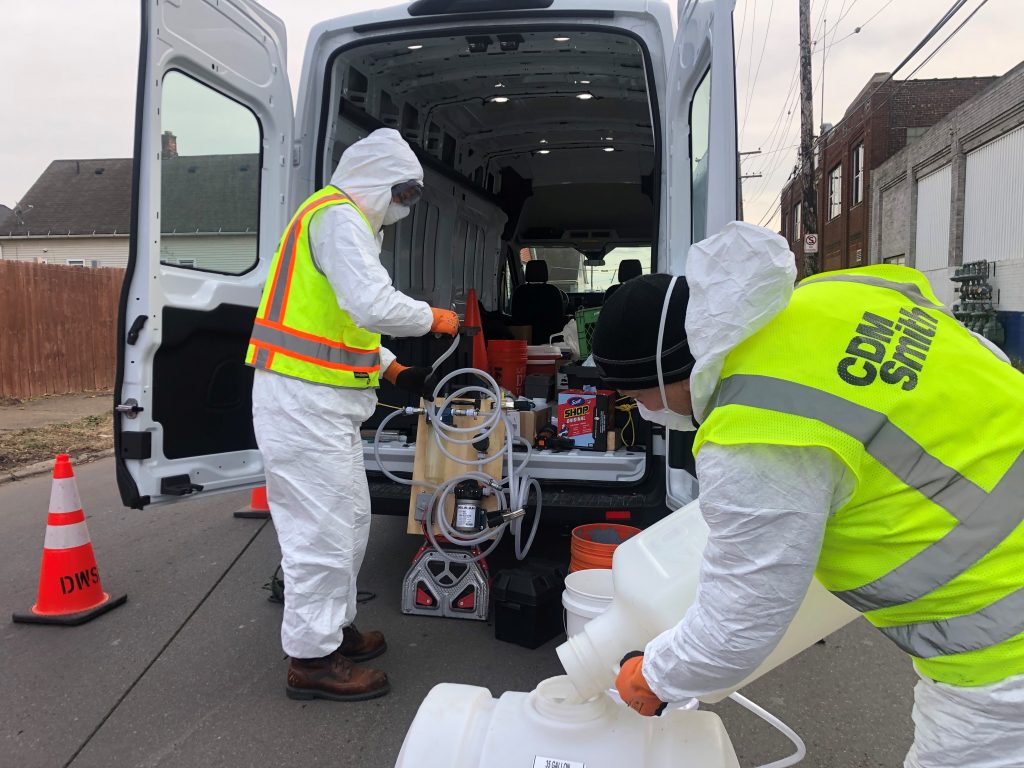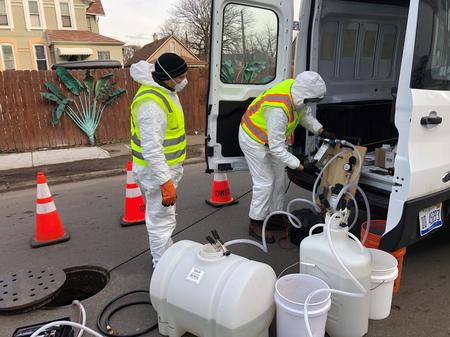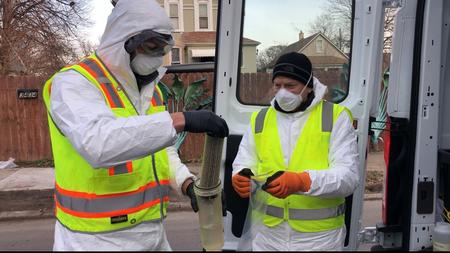MSU Researchers Test Detroit Area Sewage for Coronavirus
Researchers say some of their models predict viral outbreaks two weeks before they’re seen by doctors. The Michigan Department of Environment, Great Lakes, and Energy provided $800,000 to expand the pilot program to monitor the spread of COVID-19.

Monitoring the spread of COVID-19 has been one of the biggest challenges facing public health officials during the pandemic. But engineers at Michigan State University have developed a technique that could track the spread of coronavirus before it appears in clinics and hospitals.

About a dozen times a week in Detroit, technicians with the firm CDM Smith take long plastic tubes and carefully snake them down into the city’s sewers.
“The sample goes through an electro-positive cartridge filter specifically looking for virus in the sewer and captures it on the outside of the filter,” explains engineer Andy Kaye as he works quickly to pump gray water from a manhole and into his testing equipment.
Kaye takes different plastic jugs to catch the wastewater, flushing out his testing machine before he gets a read at this new sewer site in Southwest Detroit. Once he’s done collecting samples, he’ll send the filters to a lab in East Lansing. CDM Smith has been working with Michigan State University since 2017, partnering with local water utilities to test for diseases.
“They set out just to look for different viruses as sort of a warning system to see what maybe there could be hepatitis or something in the community, or even flu virus,” says engineer Jim Broze.

This virus detection method was put to the test when the pandemic started. Researchers at MSU refocused their attention on SARS-CoV-2, the coronavirus that causes COVID-19
“We take samples, we do DNA, RNA extraction,” says Dr. Irene Xagoraraki, who helped develop the Viral-ID technique. “Then we do random sequencing.”
By using other data, like the flow of wastewater within a sewer system, the team has other methods to predict how a specific virus spreads within a community.
“When there is a particular threat like COVID-19, then we have another model where we focus on this,” says Xagoraraki. “Rather than screening for everything, then we focus on one disease and then we quantitate so we see how much of a SARS we have shedded by our population.”
“This is much bigger than COVID-19. We can screen for upcoming diseases and screen for the general health and also for immunity.” — Dr. Irene Xagoraraki, Michigan State University
Xagoraraki says some of their models predict viral outbreaks two weeks before they’re seen by doctors. That’s getting the attention of city and state officials. The Michigan Department of Environment, Great Lakes, and Energy provided $800,000 to expand the pilot program. Researchers are also targeting zip codes outside of Detroit, like Sterling Heights, Eastpointe, Oak Park and West Bloomfield Township.
“As soon as they detect a possible outbreak, we’re going to be notified,” says Detroit Public Health Director Denise Fair. “Then we can get on the ground and we can start messaging to our residents that may be affected.”
While COVID-19 is a respiratory disease, researchers say sewage water can provide useful information.
“Everybody poops, everybody pees,” says John Norton, a research director at the Great Lakes Water Authority. “And when you do those actions, you are shedding the viruses, or whatever is in you, out into the wastewater system.”
Some are hopeful about the potential application of the science and the effort is likely to continue in the near term. Michigan has invested a total of $10 million towards similar coronavirus surveillance pilots across the state and more funding could be allocated for the programs this year.
“This is much bigger than COVID-19,” says Xagoraraki. “Because we can continue doing this, we can screen for upcoming diseases and screen for the general health and also for immunity.”
Trusted, accurate, up-to-date
WDET is here to keep you informed on essential information, news and resources related to COVID-19.
This is a stressful, insecure time for many. So it’s more important than ever for you, our listeners and readers, who are able to donate to keep supporting WDET’s mission. Please make a gift today.
